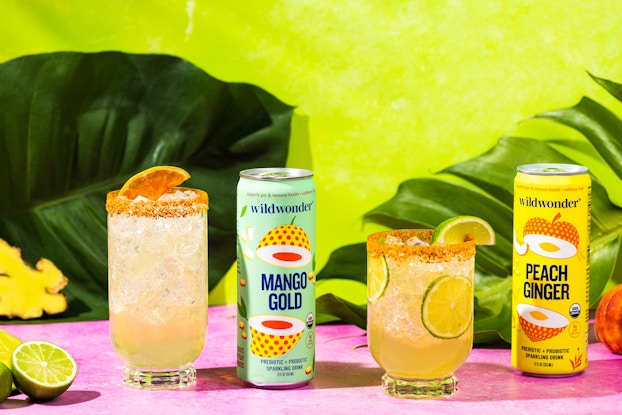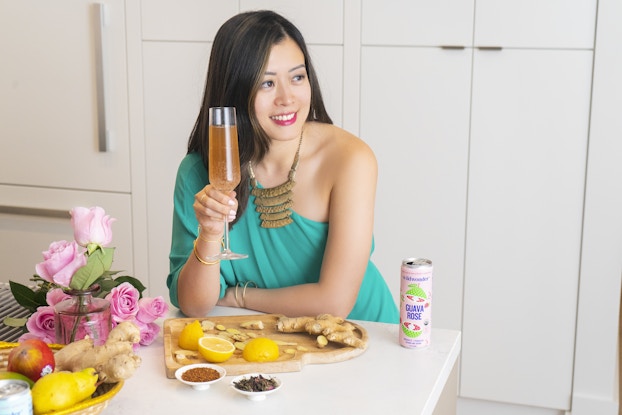
Why it matters:
- The market for probiotics and prebiotics has spiked as research points to their purported potential benefits, including promoting digestive and cognitive health.
- Rosa Li, founder and CEO of sparkling prebiotic and probiotic beverage startup wildwonder, used her investment banking and business school know-how to scale the business.
- Even after launching during the pandemic, the brand, which tackles gut health, has sold over 5 million cans in 40 states, leaning into the booming probiotic drink market in the U.S., which is expected to top $19.3 billion in 2023.
Rosa Li was working in private equity after years in investment banking when she started having digestive problems. Her hectic lifestyle didn’t lend itself to sleeping or eating well. She lost 15 pounds without realizing it.
Li went to her doctor, had her microbiome tested to learn about the organisms living in her gut, and started learning about gut health. “It really affects all aspects of our wellness, from immunity to brain health,” she said. She left her high-stress job for business school at Stanford and was inspired by Silicon Valley’s entrepreneurial spirit.
Meanwhile, Li started incorporating more purported gut-supporting foods into her diet, including foods with probiotics – microorganisms that support the good bacteria living in the digestive system—and prebiotics, high-fiber foods that act as food for good bacteria.
After graduation and a stint helping a friend with a fashion startup, Li set out to start her own business, one rooted in her Chinese heritage. She wanted to pay homage to her grandmother, Xirong, who raised her in China until Li was 12 and often made herbal tonics, by making gut-healthy ingredients more accessible and bring more diverse representation to retail shelves.
Whenever we spend, we always think about the return. How do we measure that; is it measurable?Rosa Li, Founder and CEO, wildwonder
First startup venture fizzles — but serves as a valuable springboard
Her first venture — a loose-leaf tea and herbs company—fizzled out. People don’t have the time to brew tea, she found after selling her products on Shopify, and the U.S. is more of a coffee culture. But it was a jumping off point. Before Li abandoned that business, she forged relationships with top tech companies and served fresh brewed teas and tonics from her herbs and teas during company parties. At the events, she kept getting requests to bottle her tonics. She pivoted to creating a premade healthy drink.
Now, Li is the founder and CEO of wildwonder, which bills itself as the world’s first sparkling beverage to combine prebiotics and probiotics for a healthy gut. The organic, vegan, low-sugar canned drink is a blend of herbs and botanicals with fruit flavors like mango and guava, and it’s part of the booming probiotic drink market in the U.S. The market is expected to top $19.3 billion in 2023 and climb to $39.4 billion by 2033, according to Future Market Insights.
“Wildwonder is the culmination of grandma wisdom combined with the contents of a California produce stand,” said Li. Since 2020, her company has sold over five million cans and it’s now carried in more than 3,000 retailers across 40 states, ranging from Whole Foods to Wegmans.
A pivot during the pandemic: ‘It was kind of a blessing in disguise’
To create her prebiotic and probiotic fizzy beverage, Li started by tinkering in her home kitchen. She brewed teas and experimented by adding different combinations of herbs and fruit juices.
A major challenge was carbonation. “It’s actually quite hard to do without any industrial machinery,” she said, which is cost-prohibitive for an entrepreneur. Her soda stream machine, which makes seltzer from water, wouldn’t carbonate her concoctions.
So Li recruited an engineer friend to help. Together, the two built a homemade carbonation machine from a beer keg and tubes. The contraption could quickly carbonate her brews, helping her to hone in on the right flavor balance.
Finally, with her product made and bottled — wildwonder first came in glass bottles — Li was ready to sell to retail stories. But then came COVID-19.
Li loaded up her car with bottles of her beverage and knocked on the doors of more than 100 independent grocery stores in San Francisco in three months. She volunteered to stock shelves while she talked about her product. Her scrappy approach paid off.
By the end of 2020, Li got wildwonder in over 100 local stores, including her local Whole Foods. The retailer heard about her efforts and offered her spots for two products on its shelf. Meanwhile, with online sales soaring during the pandemic, Li launched a Shopify site and started selling online and shipping to customers’ homes.
“It was kind of a blessing in disguise,” Li said, because it led to a major product shift.
Customers didn’t love bottles because they could break during transit. At the same time, Li learned through research that people often drink more from cans since they’re lighter and more convenient than bottles. “People want more convenience and accessibility,” she said.
In 2021, wildwonder switched to cans. “That completely improved the product in a tremendous way,” Li said. “People were buying more and they were drinking more often, and it was so much easier with shipping.”

Tapping investment banking and business school experience to drive sustainable growth
Next, Li set her sights on scaling up the business. Both her investment banking and business school experience helped. Throughout both, Li studied how businesses grew and she learned best practices for running a sustainable business.
“And that’s the DNA we instill in wildwonder,” she said, “building from the beginning the right infrastructure and the right business processes and structure to enable us to run and to grow with capital efficiency in mind.”
Her training helped especially with marketing, a huge area of spending for new businesses. Often, marketing spending can be haphazard, she said, with companies paying influencers or creating ads without really understanding the possible returns.
At wildwonder, Li and her team only engage in marketing opportunities where they understand the return on investment. “Whenever we spend, we always think about the return. How do we measure that; is it measurable?” If they can’t measure the ROI, they pass on the opportunity and find another one.
Scaling a business is another area Li knows can present challenges for entrepreneurs. From early days in her home kitchen, scalability was top of mind. Li was confident she could scale her product, so she pushed on. Still, she knew companies often change their flavor or formula when scaling up so they can work with a certain co-packer (specialized production facilities that make products for multiple brands). Li didn’t want that. She wanted to maintain her brand integrity.
“From the very beginning we identified a co-packer that could work with us and our product so we could eventually scale,” she says.
A ‘Shark Tank’ boost: Nationwide exposure helps wildwonder achieve 400% year-over-year growth
In January 2023, wildwonder got a boost from Li appearing on ‘Shark Tank.’ Appearing before the show’s four million viewers helped the company to grow by 400% year over year.
After Li landed a deal with the show’s first East Asian guest shark and DoorDash CEO Tony Xu, wildwonder made a whole year of online sales in just one month following the episode airing. She also grew her team from four to 10.
Since then, Li has launched products in additional stores, including Target and Kroger, and expanded in Whole Foods and Sprouts. In 2023, Google replaced its kombucha selection with wildwonder in community fridges throughout its offices. Li’s goal now is to create one new product a year.
“I’m really excited about further expansion,” she said, “and to really achieve the mission of bringing representation to shelves and being more of a mainstream product.”
CO— aims to bring you inspiration from leading respected experts. However, before making any business decision, you should consult a professional who can advise you based on your individual situation.
CO—is committed to helping you start, run and grow your small business. Learn more about the benefits of small business membership in the U.S. Chamber of Commerce, here.

What can membership do for your business?
Gain tools to stay informed, competitive, and connected by becoming a U.S. Chamber of Commerce member. Membership gives you direct access to expert policy insights, economic updates, and exclusive resources designed to help your business thrive. From behind-the-scenes analysis from D.C. to exclusive discounts and expert support, U.S. Chamber membership helps you navigate change and seize new opportunities.







